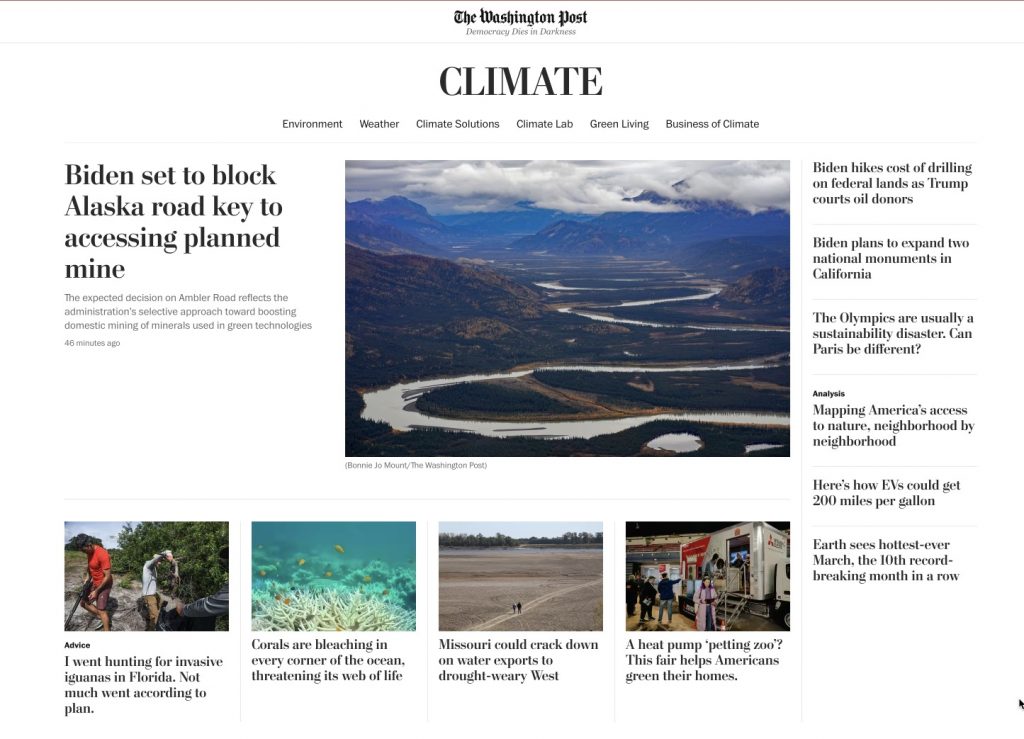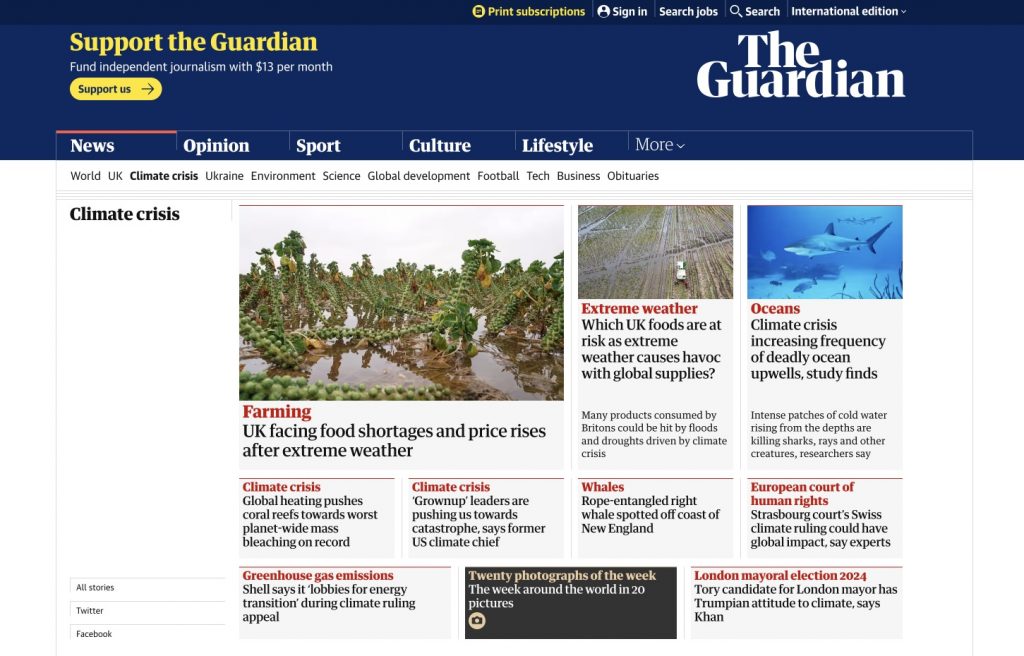As the traditional media waned with the rise of the internet a plethora of independent media services sprang up including citizen journalists, propagandists and some genuine efforts to provide alternative, thoughtful journalism.
Mitchell Beer is one of the success stories in the later category in Canada. He started The Energy Mix 10 years ago and since then has published or shared 30,000 stories on climate change.
I met Beer years ago because our paths regularly cross in the independent media space. The Energy Mix cuts a broad swath covering communities, electric mobility, climate policy and a host of other issues, so how did it get started?

“I’ve been in and around the renewable energy space since 1977, and climate change since 1997,” says Beer.
“My first job was at a paper called Canadian Renewable Energy News that launched in on Halloween, October 31st, 1977.”
Beer left that job three years in, but he knew he had found his calling.
“I knew what work I was meant to do and spent way too long getting back into it, which means that every single day now is just a moment of gratitude that I get to do this work in this time.”
For much of Beer’s career climate change was ignored, or covered very poorly by the mainstream media, so it felt like the work was critical to Beer.
But that all changed in the last decade as major media outlets decided to stop covering the naysayers who were clinging to alternative strands of pseudo-science to resist action on Climate Change.

Climate journalism – from the hinterlands to the front burner
“Last September, I got to attend a climate journalism conference in New York City at the Columbia Journalism School. There were two hundred [journalists] in the room. One of the panel chairs said, I’m on air every night to an audience of 8 million people in the San Francisco Bay Area.”
Indeed the Guardian in Britain led this charge along with many other large media outlets.
“This is better than it’s ever been, and I’m so proud of the profession,” says Beer.
In 2022 while the Washington Post was in the middle of a round of layoffs “they expanded their climate desk to 30 people,” he says.
Beer began to wonder if the work of independents like The Energy Mix was still needed.
But all he had to do is look around at the massive challenges facing humanity in tackling climate change to refocus on the need for this work.
“We realized that there is still even more need for targeted, specialized content that reaches specific audiences with stuff that goes more in-depth than you can put on an evening TV newscast or weathercast,” says Beer.
Beer operates The Energy Mix as a not-for-profit. It’s not a lucrative profession, but for Beer it’s the mission that keeps him jazzed about his work every day.


The Energy Mix recipe
The Energy Mix got its name from the basic idea that how this all turns out depends almost completely on how the world gets its mix of energy in the future, but it also refers to a mix of opinions.
“Not to be too precious about it, but a mix is also a bunch of different perspectives. And what this looks like in Fort McMurray, or in Estevan, Saskatchewan is going to be really different from what it looks like in the center of the universe in downtown Toronto,” says Beer with a smirk. Beer lives and works in Ottawa.
The Energy Mix works hard to shed light on the messy politics of climate change, but that can’t be all it’s about says Beer.
“We see a lot of publications out there that just strictly focus on the crisis. And frankly, I think that is journalistic, professional and community malpractice because if all we’re doing is driving people deeper into despair, that’s not going to work.”
So, at The Energy Mix while you will find stories on drought, wildfires and all the climate change targets being missed by governments, but you will also find stories on microgrids, solar, and energy efficiency. A headline story the week we did the interview was on Okotoks, Alberta the town that pioneered the use of community-scale solar thermal heating many years ago. Unfortunately, the Okotoks headline is not particularly positive “Pilot Solar Community in Alberta Fears Potential Shift to Gas Heating.”
The decline of Alberta in climate news
So how is Alberta faring in climate news these days?
Up until last year despite Alberta’s preoccupation with conventional energy industries, there were many stories about innovation, and Albertas booming renewable energy industry.
But that came to a grinding halt last year when the government declared a moratorium on renewable energy putting $14 billion-plus projects on hold.
It was one of Alberta’s only significant actions to reduce greenhouse gas emissions, even if it was only an accidental benefit of the booming renewable energy industry.
When the moratorium was lifted an onerous series of restrictions and red-tape were announced sending investors and developers scrambling to look at other jurisdictions.
“Frankly, Alberta is being let down by the elected officials and the ideologues in your own province who are leading you down a path to economic as well as environmental disaster,” says Beer.
The success in the renewable energy industry was a gateway to stories about Alberta innovators involved in energy storage, green buildings and more.
Locking into gas heating and emissions
But what is being covered now? Beers says in one example he’s noticed a trend in natural gas companies scrambling to protect their interests.
“The gas [industry] is desperately trying to get new connections into the ground … so that all of this new housing construction that many governments are to one degree or another interested in right now, that as many as possible of those homes will be hooked up to gas,” says Beer.
The trouble is Canadian and global goals are to radically reduce greenhouse gas emissions by 2035 and to ultimately reach net-zero by 2050.
Installing natural gas hookups in new neighbourhoods “means they’ll be locked into that fuel for the next 20 or 30 years,” says Beer.
And by the gas industry’s own admission there is no way to capture emissions from natural gas used in home heating.
“It’s happening in BC, it’s happening in Ontario” as well says Beer.
“Renewable energy costs in Alberta today – solar plus storage and wind plus storage are cheaper than new gas. So, they’re working against the markets,” says Beer.
In Vancouver where 56% of its emissions come from buildings, the city is looking to scale back natural gas from heating buildings.
“Their only option [for gas companies] is to lobby madly. Greenwash madly, so there’s a court case now against FortisBC for greenwashing gas as a supposedly clean fuel,” says Beer.
This is just one area of reporting, Alberta also makes the news for its lacklustre efforts to use carbon capture and storage.
More collaboration and less polarization needed
Beer says he’d much rather report on success stories from Alberta.
“I would love to report the story, but I doubt it’s where she [Premier Danielle Smith] wants to go. And basically, they are doing their best to obstruct the industry that is Alberta’s best shot at diversifying its economy, and getting out of the boom and bust cycle that has plagued the province for generations.”
One of Beer’s biggest frustrations is the state of political discourse these days. So many of these stories are driven by political ideology and the destructive strategy of creating intense polarization.
The climate crisis needs collaboration, and cooperation to transition to a sustainable model that can provide a safe planet and an economy with jobs in the future.
“We need to open up all the doors and windows and err on the side of having too many friends and not enough enemies,” said Beer.





